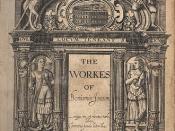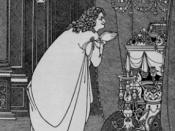Introduction
Ben Jonson lived and worked during the times of the English Renaissance theatre. The "dark" Middle Ages were followed by a time known in art and literature as the Renaissance. The word "renaissance" means "rebirth" in French and was used to denote a phase in the cultural development of Europe between the 14th and 17th centuries.
The wave of progress reached the shores of England only in the 16th century. The ideas of the Renaissance came to England together with the ideas of the Reformation and were called the "New Learning". The English poets and dramatists popularized much of the new learning. The freedom of thought of English humanists revealed itself in antifeudal ideas, showing the life of their own people as it really was.
The development of the drama in England was in close connection with the appearance and development of the theatre. During the Renaissance period women were not allowed on the stage, therefore, men had to cross-dress to play their parts.
The regular drama from its very beginning was divided into comedy and tragedy.
Volpone: Jonson's experimentation with Comedy
Many critics of Jonson's Volpone have argued that it is not a true comedy but rather a mix of tragedy, comedy, and satire. Although Volpone takes on some characteristics of tragedy, it seems to follow closer to the customs of comedy. But it is not the traditional form of comedy. It is a play that takes on the form of a comical satire as well as a morality play. It also adapts the features of a fable in that it strives to teach a moral. Jonson presents his audience with an unconventional way of approaching the subjects he is satirizing by creating a new form of comedy.
This play to be more like a satirical comedy,


